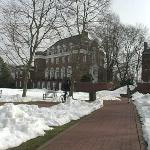
St. John's College looks like a typical American college. But what goes on inside its classrooms is unlike just about every other college in the United States. At this small institution, about 60 kilometers north of Washington, D.C., every student is devoted to reading the classics of Western Civilization. That's why St. John's is also known as the "Great Books" School.
The roughly 450 students of St. John's believe very much in dialogue, an unusual kind of dialogue. Their classroom discussions are often about great works of literature by authors who lived thousands of years ago. Another unusual feature is there are no class lectures; instead, the students meet together with faculty members to explore the books being read.
Michael Dink is dean of St. John's College: "We're interested in understanding and pursuing the truth, and no single individual, no single book, has those answers. So we need to talk to one another, we need to learn from one another."
Many St. John's students cited this unique approach as their main reason for coming to the College. But none seemed to agree on their favorite great book - not surprising, given there are about 100 of them on the St. John's list.
"I don't think there's anywhere else that you can more fully live the life of the mind. And here my favorite program book so far has been the Iliad, because I think you get the full spectrum of human experience," said Dylan Knight Rogers, St. John's student from Chicago, Illinois.
"I came here because I felt like there was nowhere else I could ask the questions that I wanted to ask. My favorite program book so far is the Odyssey, because I think it explores the human [experience] more fully than any other book I've ever read," said Geral Newman, St. John's student.
"My favorite book so far has been Aristotle's Nicomachean Ethics. And I came here for the small, close-knit community devoted to learning," said student Keileigh Rhodes from Boston, Massachusetts.
St. John's does not allow cameras into students' seminars. But to give a taste of what one might be like, we assembled a few students for a seminar-style discussion.
"Freshman, sophomore, junior, senior year, you know exactly what anyone is going through at any point in time during the year. And the fact that you can just go up and engage in a conversation about what they're reading, that really reinforces the community," said Rachael Boyce, St. John's student from Baltimore, Maryland.
"The ideas present, I think, apply to everyone in the world. Or they can apply to everyone in the world, regardless of where you're from. I think that's part of the value of these books, that they're universal in character," said Martin Greenwald from Bethesda, Maryland.
At most American colleges, undergraduate students choose one area of study, like English or biology, and focus on it for all four years of their education. But since the St. John's curriculum aims to span almost all of Western culture, students study every branch of the liberal arts - including music. Here a group of sophomores warms up for music class.
"I think that if you take a St. John's education seriously, then it has to change your life. Maybe not everyone takes it that seriously. But reading what we read here, and engaging in honest conversation about it, has to change you," said Barbara McClay, a student from Annapolis, Maryland.
Dean Dink says a St. John's education can help make students more thoughtful citizens. "They should have thought about what democracy is, what good government is, what justice is. The kind of fundamental reflection we do here is important for citizens in a democracy," he said.
American colleges are going green
Some advice on choosing a college
US colleges set enrollment record
College guide aims to help students avoid a 'thin education'
(來(lái)源:VOA 編輯:陳丹妮)
